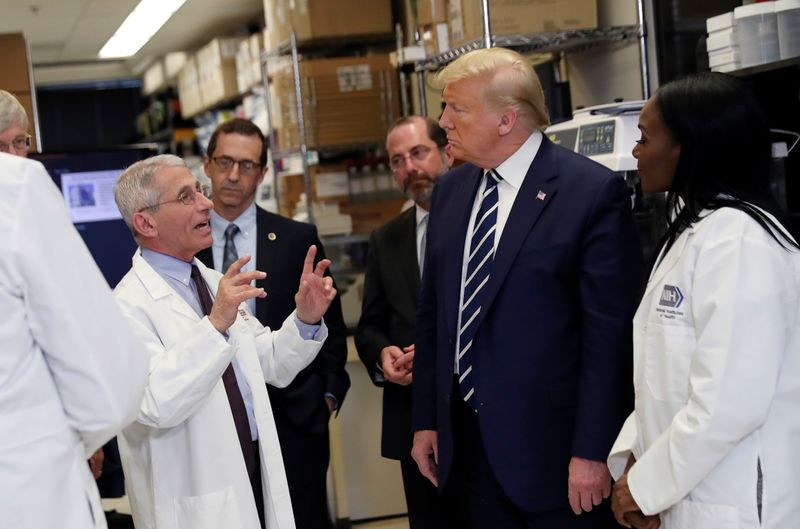By David Morgan and Richard Cowan
WASHINGTON (Reuters) - The U.S. House of Representatives overwhelmingly approved on Wednesday an $8.3 billion bill to combat the spread of the new coronavirus and develop vaccines for the highly contagious disease, sending it to the Senate for final passage.
Reflecting the urgency among lawmakers to address the growing coronavirus crisis, the House voted 415-2 on the bill just hours after negotiators unveiled its contents.
A Senate vote was scheduled for Thursday.
It includes money to expand testing for the virus, which has infected at least 129 people in the United States. Two more deaths were reported on Wednesday, taking the U.S. toll to 11.
With the White House backing the effort, congressional leaders worked to win fast passage so that President Donald Trump could potentially sign it into law this week.
"We must quickly enact this legislation. Lives are at stake," House Appropriations Committee Chairwoman Nita Lowey, a Democrat, said in a statement.
The measure would provide far more money than the $2.5 billion initially sought by the Trump administration.
Shortly before the vote, the top four Democratic and Republican leaders in Congress received a classified briefing about contingency plans for Congress if there was a coronavirus outbreak in Washington.
An estimated 3 million people come through the Capitol Visitor Center each year.
Following the meeting, the lawmakers brushed off reporters' questions on whether plans were needed for Congress to meet somewhere else or whether public access to the Capitol might eventually be curtailed.
Representative Matt Gaetz, after a separate closed briefing for Republican lawmakers with Vice President Mike Pence about coronavirus preparations nationwide, compared the House chamber to a "petri dish" for incubating germs.
"We all fly in these dirty airports, we touch and selfie everyone we meet and then we congregate together," the Florida congressman said.
Later, during the vote, Gaetz was spotted sitting in the House chamber wearing a gas mask.
'NOT WHERE WE WANT TO BE'
Under the bill, over $3 billion would be devoted to research and development of coronavirus vaccines, test kits and therapeutics. No vaccines or treatments for the virus are currently in place, but patients can receive supportive care.
Gaetz said that while the United States was gearing up in the production of virus test kits, "we're not where we want to be. The vice president made that very clear that we've got to get more test assets in place."
In a bid to also help control the spread of the virus outside the United States, $1.25 billion would be available for international efforts.
The fast-spreading virus that emerged late last year in central China is now in some 80 countries. It has killed more than 3,000 worldwide and rattled financial markets.
State and local governments would receive $950 million to support their work in combating the respiratory disease.
Senate Appropriations Committee Chairman Richard Shelby, a Republican, called the bill "an aggressive and comprehensive response" to the crisis.
Included is more than $300 million to help cover costs of any vaccine for those who cannot afford it. The Department of Health and Human Services would be authorized to ensure vaccines' affordability in the commercial market.
Republicans cited a $7.8 billion cost for the bill, instead of $8.3 billion. That does not include $500 million authorized for a "telehealth" program for senior citizens.
Other provisions in the bill:
** $2.2 billion in public health funding for prevention, preparedness and response, including the $950 million to bolster state and local government efforts.
** Nearly $1 billion to help procure drugs and medical supplies

** Small businesses affected by an outbreak could qualify for low-interest federal loans.